|
|
|
Sort Order |
|
|
|
Items / Page
|
|
|
|
|
|
|
| Srl | Item |
| 1 |
ID:
125448
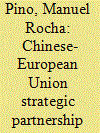

|
|
|
|
|
| Publication |
2013.
|
| Summary/Abstract |
The people's republic of China and the European Union (EU) have designed different projects for their inclusion into the international system. However the contrast among the different meaning that each actor gives to concepts like sovereignty, global security, human right or multilateralism has not been an obstacle to establish cooperation nexuses.
|
|
|
|
|
|
|
|
|
|
|
|
|
|
|
|
| 2 |
ID:
130893
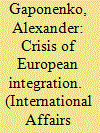

|
|
|
|
|
| Publication |
2014.
|
| Summary/Abstract |
AFTER THE USSR'S COLLAPSE, the Baltic states came under the political influence of the US and the economic influence of the European Union. This influence was used by their new geopolitical "curators" to initiate an anti-Russian line in both the foreign and domestic policies of Latvia, Lithuania and Estonia, as well as to break their economic ties with Russia. At present, the only significant economic ties that Russia still has with the Baltic countries are in the energy sector. It's the supply of natural gas through the pipeline and distribution systems with the use of the Incukalns underground storage facility. It's also the supply of Russian electricity and rail deliveries of hydrocarbons via the Ventspils and Klaipeda ports.
|
|
|
|
|
|
|
|
|
|
|
|
|
|
|
|
| 3 |
ID:
137800
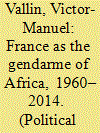

|
|
|
|
|
| Summary/Abstract |
THE EMERGENCE OF FRANCE AS THE GENDARME OF AFRICA goes back to the 1960s and the independence of its African colonies. Unlike other European colonial powers, such as the United Kingdom, France was faced late with decolonization and, most of all, wished to maintain an exclusive influence over its former colonial empire. French West Africa and French Equatorial Africa disappeared, but France sought to maintain privileged and lasting political, cultural, economic, and military relations with the former colonies. The new African regimes would receive military and technical assistance from France in return for backing its international policies. Paris thus established a type of nested neocolonial association with these sub-Saharan states of limited sovereignty. This defined France's pré carré in Africa, its area of exclusive action.
|
|
|
|
|
|
|
|
|
|
|
|
|
|
|
|
| 4 |
ID:
124368
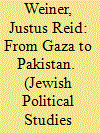

|
|
|
|
|
| Publication |
2011.
|
| Summary/Abstract |
On the one hand, there is Israel's targeted killing (TK) policy which has been conducted in almost full compliance with Human Rights Watch's stated test, executed with remarkable transparency, and has achieved unprecedented levels of intelligence accuracy, with less than one civilian fatality average per TK. In over 95 percent of Israeli TKs neither the identity of the targeted militant nor his involvement in hostilities was subject to dispute. On the other hand, there is a Western TK policy which in many cases did not comply with HRW's stated test and is conducted behind a cloak of systemic and deliberate opacity, with virtually no public scrutiny. Due to faulty or compromised intelligence, this policy resulted in a large number of TKs where the target was not in fact at the targeted location, and with a ratio of more than ten civilian fatalities per TK.
|
|
|
|
|
|
|
|
|
|
|
|
|
|
|
|
| 5 |
ID:
187613


|
|
|
|
|
| Summary/Abstract |
The European legislative framework asks for massive application of renewable energy source (particularly of photovoltaic systems) in the built environment to face the recent energy crisis, reducing energy demand, environmental emissions, and costs. These policies could generate serious preservations problems for architecturally sensitive areas, such as historical towns, historic buildings, and protected landscapes. Inside them, photovoltaic technologies have several benefits for the built environment related to aesthetic appeal, reliability, modularity, scalability, versatility, low maintenance costs, and peak shaving. The major challenge for their application is the presumed negative impact on heritage value. Thus, the diffusion of these systems in the territory is hindered by a social diffidence on their acceptability due to legislative, cultural, technical, and economic barriers. To support the definition of appropriate policies, and realistic targets, the study presents a complete discussion on policy-related design criteria for integrating photovoltaic systems on cultural heritage. This socio-technical analysis can increase a cleaner and integrated energy production, favoring the energy transition and the mitigation of climate changes, respecting heritage and natural values, and considering current energy needs, and innovative developments of photovoltaic systems. The comparison of relevant research projects, scientific studies, awards, and guidelines describes the state of the art of this topic, also identifying 42 international guidelines on energy efficiency, renewable sources, and solar integration on cultural heritage. International recommendations are categorized to find recurring, and applied design criteria for architectural heritage sites, protected landscapes, historic and traditional buildings, and building extensions. Then, updated criteria, pros, and cons for a possible integration are defined through specific focus groups with the Heritage Authorities. These activities are based on international criteria of architectural conservation. The synopsis of these results shows non-negotiable criteria for heritage-compatible solar applications. Finally, the study presents some policy-relevant implications connected with these design criteria, to define realistic energy targets and scenarios, to prepare strategic policy options (e.g., guidelines, rules, policies, and financial incentives) based on updated criteria, correct targets, and recent innovations, to implement existing energy policies in a correct way, to correctly assess restoration design projects, and to evaluate socio-economic trends of innovative photovoltaics' markets.
|
|
|
|
|
|
|
|
|
|
|
|
|
|
|
|
| 6 |
ID:
122982


|
|
|
|
|
| Publication |
2013.
|
| Summary/Abstract |
This paper builds upon previous research on American state-of-the-union addresses and Russian geopolitics by examining how the Kremlin has represented Russia's geographic and geopolitical position in the post-Soviet era. It analyses presidential addresses to the Federal Assembly from 2000 to 2011, a period encompassing Vladimir Putin's first two terms as president and the single term of Dmitry Medvedev. In addition to exploring general trends evident in these speeches, this paper also provides in-depth analyses of three major themes: Russia's civilisational identity, the state of the international system and Russia's role within it, and global economics. We find that the legacies of the Cold War-era perceptions of threat, as well as dissatisfaction with the Cold War's resolution, remain salient in these speeches. However, there is some movement toward a broadening of Russia's cognitive map.
|
|
|
|
|
|
|
|
|
|
|
|
|
|
|
|
| 7 |
ID:
131491
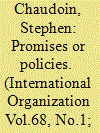

|
|
|
|
|
| Publication |
2014.
|
| Summary/Abstract |
A key assumption of audience costs theories of crisis bargaining and international cooperation is that audience members have strong preferences for consistency between their leader's commitments and actual policy choices. However, audiences also have strong preferences over the policy choices themselves, regardless of their consistency with past commitments. I conducted a randomized survey experiment to evaluate the magnitude of consistency and policy effects in the context of international agreements over trade policy. Respondents with expressed policy preferences, whether supporting or opposing free trade, have muted reactions to learning that their leader has broken an agreement. Only respondents with no opinion on trade policy are affected by learning that their leader's policy is inconsistent with prior commitments. This suggests that constituents' underlying preferences limit the degree to which audience costs influence policymakers' calculations
|
|
|
|
|
|
|
|
|
|
|
|
|
|
|
|
| 8 |
ID:
130703
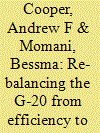

|
|
|
|
|
| Publication |
2014.
|
| Summary/Abstract |
This article contributes to the literature on global governance, legitimacy, and small states through a detailed analysis of the Global Governance Group. It examines in particular the operational impact and wider conceptual implications of the 3G's collective diplomatic efforts on the Group of 20. By engaging in a reconfigured form of informal multilateralism, the article finds that the 3G has been and is capable of shaping the global agenda with respect to the G-20 in a way that is both more inclusive and connected with existing institutions, especially the United Nations. Through this initiative, this group has effectively recalibrated the existing narrative about small states, the G-20, and global governance-shifting it from the paradigm of efficiency to one of legitimacy.
|
|
|
|
|
|
|
|
|
|
|
|
|
|
|
|
| 9 |
ID:
124491
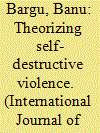

|
|
|
|
|
| Publication |
2013.
|
| Summary/Abstract |
The first image that the question of violence in the Middle East conjures up, especially in the West, is that of the suicide bomber. This association, etched into the political imaginary particularly over the course of the last two decades, is due neither to the number of victims suicide bombing creates (more conventional weapons of war can claim as many or more victims), nor to the identity of its victims (conventional weapons are also often directed at civilians). Rather, the potency of the image of the suicide bomber is connected to the simultaneously self-destructive and other-directed form that this act of violence takes. If the Orientalist impulse that has raised the image of the suicide bomber to iconic status is deeply problematic, it nonetheless constitutes an involuted acknowledgement of a reality: the significant rise in self-destructive violence (and not just in the Middle East). I have in mind practices such as hunger striking, self-immolation, and fatal self-mutilation, which constitute an emergent repertoire of struggle that has come to mark a certain current of radical politics around the globe. Those modalities of self-destructive violence that are not directed at others are overshadowed by suicide bombing.
|
|
|
|
|
|
|
|
|
|
|
|
|
|
|
|
| 10 |
ID:
130922


|
|
|
|
|
| Publication |
2014.
|
| Summary/Abstract |
Russian ethnic press in the United States was examined to understand how political identity and loyalties are negotiated in conflictual situations. News coverage of eight foreign policy controversies was studied in terms of tone, emphasis-or lack thereof-on the conflict between the US and Russia, and attributes the newspapers assigned to the two countries. Most of the coverage was neutral in tone. The conflict was mostly de-emphasized. Attributes assigned to the two countries were in the middle of the conflict-cooperation spectrum, avoiding the extremes. These findings suggest that Russian American ethnic newspapers provide a balanced coverage of both the country of origin and that of adoption, thereby pointing to a hybrid political identity of their readers. However, when US security interests are perceived to be at stake, the said press tends to be more pro-American.
|
|
|
|
|
|
|
|
|
|
|
|
|
|
|
|
|
|
|
|
|